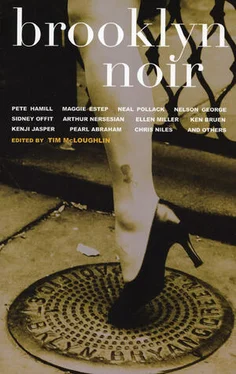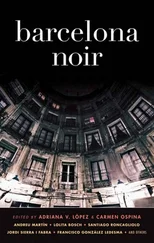He could sense the feral pack behind him, filling the silent streets with howls. He had heard them often in the past few years, on beaches at dusk, in too many dreams. The voices of women, wordless but full of accusation: wives, and girlfriends, and one-night stands in college towns; women his own age and women not yet women; women discarded, women used, women injured, coming after him on a foggy moor, from groves of leafless trees, their eyes yellow, their clothing mere patchy rags. If they could speak, the words would be about lies, treacheries, theft, broken vows. He could see many of their faces as he moved, remembering some of their names, and knew that in front, leading the pack, was Molly Mulrane.
Crossing a street, he slipped on a ridge of black ice and banged against the hood of a parked car. Then he looked back. Nobody was there.
He paused, breathing hard and deep.
Not even Seanie had come after him.
And now the book signing filled him with another kind of fear. Who else might come there tonight, knowing the truth? Hauling up the ashes of the past? What other sin would someone dredge up? Who else might come for an accounting?
He hurried on, the feral visions erased. He was breathing heavily, as he always did when waking from bad dreams. A taxi cruised along the avenue, its rooftop light on, as if pleading for a fare to Manhattan. Carmody thought: I could just go. Just jump in this cab. Call the store. Plead sudden illness. Just go. But someone was sure to call Rush & Malloy at the Daily News or Page Six at the Post and report the no-show. Brooklyn Boy Calls It In. All that shit. No.
And then a rosy-cheeked woman was smiling at him. The manager of the bookstore.
“Oh, Mister Carmody, we thought you got lost.”
“Not in this neighborhood,” he said. And smiled, as required by the performance.
“You’ve got a great crowd waiting.”
“Let’s do it.”
“We have water on the lectern, and lots of pens, everything you need.”
As they climbed to the second floor, Carmody took off his hat and gloves and overcoat and the manager passed them to an assistant. He glanced at himself in a mirror, at his tweed jacket and black crew-collared sweater. He looked like a writer all right. Not a cop or a fireman or even a professor. A writer. He saw an area with about a hundred people sitting on folding chairs, penned in by walls of books, and more people in the aisles beyond the shelves, and another large group standing at the rear. Yes: a great crowd.
He stood modestly beside the lectern as he was introduced by the manager. He heard the words, “one of Brooklyn’s own…” and they sounded strange. He didn’t often think of himself that way, and in signings all over the country that fact was seldom mentioned. This store itself was a sign of a different Brooklyn. Nothing stays the same. Everything changes. There were no bookstores in his Brooklyn. He found his first books in the public library branch near where he lived, or in the great main branch at Grand Army Plaza. On rainy summer days he spent hours among their stacks. But the bookstores — where you could buy and own a book — they were down on Pearl Street under the El, or across the river on Fourth Avenue. His mind flashed on Bomba the Jungle Boy at the Giant Cataract The first book he’d ever finished. How old was I? Eleven. Yes. Eleven. It cost a nickel on Pearl Street. That year, I had no bad dreams.
During the introduction, he peered out at the faces, examining them for hostility. But the faces were different too. Most were in their thirties, lean and intense, or prepared to be critical, or wearing the competitive masks of apprentice writers. He had seen such faces in a thousand other bookstores, out in America. About a dozen African-Americans were scattered through the seats, with a few standing on the sides. He saw a few paunchy men with six or seven copies of his books: collectors, looking for autographs to sell on eBay or some fan website. He didn’t see any of the older faces. Those faces still marked by Galway or Sicily or the Ukraine. He didn’t see the pouchy, hooded masks that were worn by men like Seanie Mulrane.
His new novel and five of the older paperbacks were stacked on a table to the left of the lectern, ready for signing, and Carmody began to relax. Thinking: It’s another signing. Thinking: I could be in Denver or Houston or Berkeley.
Finally, he began to read, removing his glasses because he was near-sighted, focusing on words printed on pages. His words. His pages. He read from the first chapter, which was always fashioned as a hook. He described his hero being drawn into the mysteries of a grand Manhattan restaurant by an old college pal, who was one of the owners, all the while glancing up at the crowd, so that he didn’t sound like Professor Carmody. The manager was right: It was a great crowd. They listened. They laughed at the hero’s wisecracks. Carmody enjoyed the feedback. He enjoyed the applause too, when he had finished. And then he was done, the hook cast. The manager explained that Carmody would take some questions, and then sign books.
He felt himself tense again. And thought: Why did I run, all those years ago? Why did I do what I did to Molly Mulrane?
I ran to escape, he thought.
That’s why everybody runs. That’s why women run from men. Women have run from me too. To escape.
People moved in the folding chairs, but Carmody was still. I ran because I felt a rope tightening on my life. Because Molly Mulrane was too nice. Too ordinary. Too safe. I ran because she gave me no choice. She had a script and I didn’t. They would get engaged and he’d get his B.A. and maybe a teaching job and they’d get married and have kids and maybe move out to Long Island or over to Jersey and then — I ran because I wanted something else. I wanted to be Hemingway in Pamplona or in a café on the Left Bank. I wanted to make a lot of money in the movies, the way Faulkner did or Irwin Shaw, and then retreat to Italy or the south of France. I wanted risk. I didn’t want safety. So I ran. Like a heartless frightened prick.
The first question came from a bearded man in his forties, the type who wrote nasty book reviews that guaranteed him enure.
“Do you think if you’d stayed in Brooklyn,” the bearded man asked, “you’d have been a better writer?”
Carmody smiled at the implied insult, the patronizing one.
“Probably,” he answered. “But you never know these things with any certainty. I might never have become a writer at all. There’s nothing in the Brooklyn air or the Brooklyn water that makes writers, or we’d have a couple of million writers here…”
A woman in her twenties stood up. “Do you write on a word processor, or longhand, or a typewriter?”
This was the way it was everywhere, and Carmody relaxed into the familiar. Soon he’d be asked how to get an agent or how he got his ideas and how do I protect my own ideas when I send a manuscript around? Could you read the manuscript of my novel and tell me what’s wrong? The questions came and he answered as politely as possible. He drew people like that, and he knew why: He was a success, and there were thousands of would-be writers who thought there were secret arrangements, private keys, special codes that would open the doors to the alpine slopes of the bestseller lists. He tried to tell them that, like life, it was all a lottery. Most didn’t believe him.
Then the manager stepped to the microphone and smiled and said that Mr. Carmody would now be signing books. “Because of the large turnout,” the manager said, “Mr. Carmody will not be able to personalize each book. Otherwise many of you would have a long wait.” Carmody thanked everybody for coming on such a frigid night and there was warm, loud applause. He sat down at the table, and sipped from a bottle of Poland Spring water.
Читать дальше












